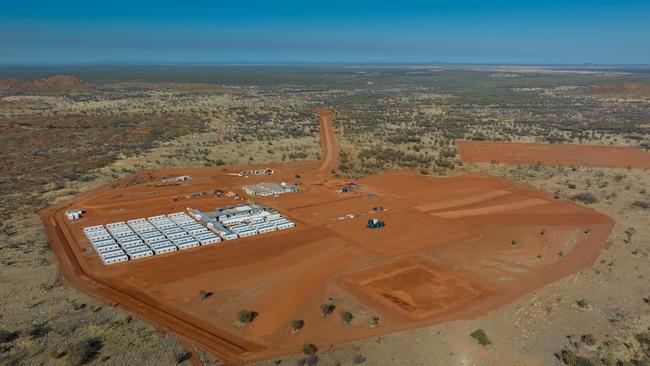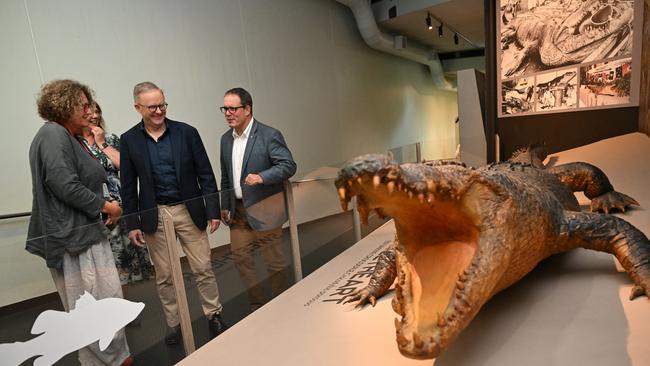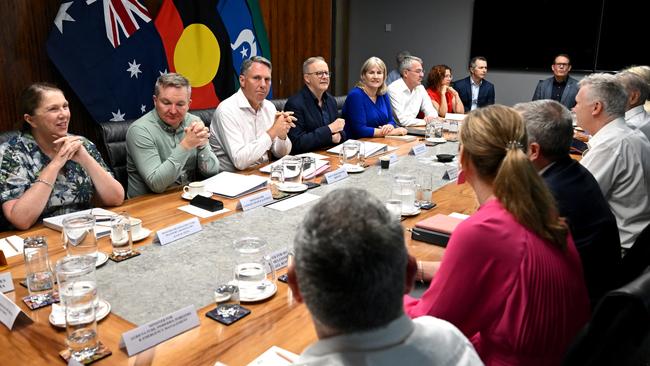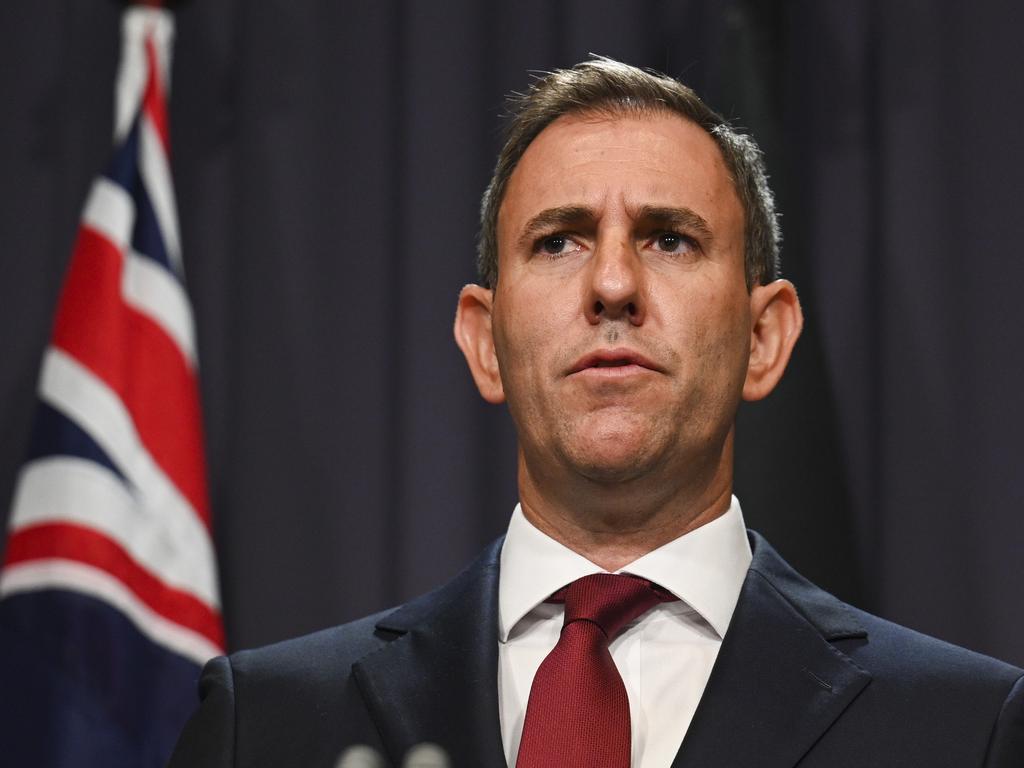Anthony Albanese’s $1.1bn bet on rare earths and lithium
The PM will underwrite almost $1.1bn in loans and grants to build a rare earths mine and refinery in the NT and support a WA lithium mine, both backed by Gina Rinehart.

Anthony Albanese will underwrite almost $1.1bn in loans and grants to build a rare earths mine and refinery in the Northern Territory and support a major West Australian lithium mine, both backed by Australia’s richest person Gina Rinehart.
The Prime Minister will announce an $840m package on Thursday to deliver the nation’s first combined rare earths mine and refinery operated by Australian mineral exploration company Arafura, which has spent decades trying to get the project off the ground.
The government has also intervened to ensure Liontown’s lithium mine delivers its first production this year via a $550m loan agreement, including $230m underwritten by the taxpayer-funded Clean Energy Finance Corporation and Export Finance Australia.
After cabinet signed off on the Arafura rare earths package in Darwin on Wednesday, Mr Albanese said the project would create about 200 jobs during construction and more than 125 ongoing full-time jobs.
The government’s intervention comes amid growing pressures on the market to fund Australian projects as China fuels major disruption of global nickel, lithium, rare earths and iron ore supply chains, including backing a massive jump in production of low-grade nickel in Indonesia that sparked a price crash.
After Resources Minister Madeleine King held crisis talks with distressed nickel and lithium miners in January, Mr Albanese pledged the government would provide direct support to keep them afloat.
Ms Rinehart, whose wealth is estimated at more than $50bn, claimed an almost 10 per cent stake in Arafura via Hancock Prospecting in December 2022. The WA billionaire is Liontown’s biggest shareholder after increasing her stake to 19.9 per cent in October last year.
Peter Dutton was forced to defend himself last week after making a flying visit to Perth for Ms Rinehart’s 70th birthday party. The Opposition Leader described her as a “dear friend, great Australian and Australia’s most successful businesswoman”.
Under the Arafura financing package, the government’s contribution includes $30m in grant funding approved by the Morrison government, $495m from the Critical Minerals Facility, $200m from the Northern Australia Infrastructure Facility and $115m from Export Finance Australia’s commercial account. The funding is linked to concessional loans, except the grant money.

As the US, Australia, Japan, Korea and other western nations join forces to create new tech, clean energy and electric vehicle supply chains away from China, Mr Albanese said he was focused on “a future made in Australia, and this project is an important part of that plan”.
Arafura, which has indicated it can raise $840m from international partners, will produce high-purity rare earths including neodymium-praseodymium oxide, which is used by advanced magnet manufacturers based in Japan, Korea and China. There is also demand from EV, automotive, wind turbine, renewables and phone manufacturers, defence technology firms and robotics companies across Europe, Asia and the US.
The Prime Minister said Arafura’s Nolans project, which is 125km north of Alice Springs and seeks to secure 20 per cent local Indigenous employment, would unlock jobs and economic opportunities across Northern Australia.
“This will create local jobs and economic opportunities, helping Australian and Territory companies and workers capture more value from the game-changing critical minerals deposits we have here,” Mr Albanese said.
The Prime Minister has already splashed up to $5bn for Indigenous housing and education in the Northern Territory this week alongside NT Chief Minister Eva Lawler.
The federal government is spruiking its financial backing of the Arafura project as positioning Australia as a global leader in “ethical and sustainable” mining of rare earths and critical minerals. It believes that underwriting Arafura will unlock investment from international financiers and commercial banks.
Trade Minister Don Farrell said: “We have some of the largest deposits of critical minerals in the world and through this project, we’re encouraging more international partners like the Republic of Korea and Germany to invest in Australia and diversify global supply chains. International buyers and investors are key to developing our abundant critical minerals opportunities, which is why we are also building strong partnerships with major economies.”
Ms King, who is also the Northern Australia Minister, said: “Australia’s critical minerals will be crucial to the new low-emissions technologies that will help lower emissions and our trading partners to meet their climate goals.”
Ms Lawler said the project would position the Northern Territory as a powerhouse in the nation’s energy transition and low-emissions future and backed record levels of investment in exploration, mining and processing of critical minerals.

During his visit to Washington DC last year, Mr Albanese doubled the Critical Minerals Facility to $4bn and announced closer co-operation with the US to mine, refine and process critical minerals and rare earths.
Liontown’s lithium mine in Kathleen Valley, located 680km northeast of Perth, on Wednesday was bailed-out under a $550m loan agreement backed by the CEFC, Export Finance Australia, Commonwealth Bank, National Australia Bank and French financier Societe Generale. The deal was pulled together after the big four banks withdrew a $760m loan, months after it was put on the table.
As electric vehicle manufacturers scaled back production late last year and supply flooded the market, Australian lithium miners raised concerns about ongoing viability in an increasingly competitive environment.
Climate Change and Energy Minister Chris Bowen and Ms King on Wednesday said the Kathleen Valley Lithium project “is expected to create around 900 jobs during construction and around 450 operational jobs”. The government-backed loans will help the battery minerals producer, which has secured substantial offtake agreements with EV giant Tesla and Ford, secure the final stages of construction.
The government believes the project, located in WA’s Eastern Goldfields, could produce about 500kt of spodumene concentrate – a critical raw material required to make batteries – making it one of the nation’s largest lithium mines.
Mr Bowen said “nine out of the ten critical minerals necessary for lithium batteries can be found here in Australia, which gives us a massive jobs and economic opportunity in the net zero transformation”.
“Making lithium a major export earner puts Australia in the value chain of the world’s automotive and renewable energy industries. Kathleen Valley’s low-carbon approach will be a premium product around the globe, as the world increasingly wants critical minerals with a low-carbon footprint,” Mr Bowen said.








To join the conversation, please log in. Don't have an account? Register
Join the conversation, you are commenting as Logout